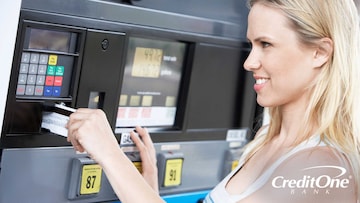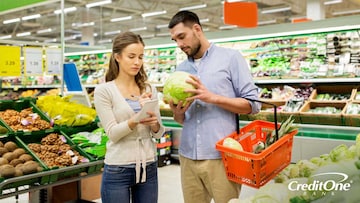Until human beings figure out how to survive without food, “groceries” is one of those expense categories in your monthly budget that's here to stay. Yes, there are things you can do to save on groceries, such as shopping on certain days of the week, clipping coupons, buying in bulk, purchasing food that’s in season, buying generic brands, and more. But did you know that how you pay for your groceries could also save you money?
It’s true. Purchasing your groceries with a credit card instead of cash or debit card could actually save you some money. It can also be superior to cash or debit card at check-out in a number of other ways, including:
A Credit Card is Convenient
Paying cash for your groceries might help you stick to your budget, but it could also put you in a bind should you come up short at the cash register. Removing items from the conveyer belt because you didn't bring enough cash can be embarrassing and require you to make another trip to the grocery store at a later date to get the things you went without on your first shopping trip.
A credit card can provide you with enough purchasing power to ensure that you get the groceries you need, when you need them. If you’re short on cash, you can still get what you need with a credit card. And, even if you don’t have enough cash in your bank account to cover your grocery purchase with a debit card, you can still get what you need with a credit card.
Using a single credit card instead of a stack of cash also keeps your purse or wallet less cluttered and bulky. And, if you use self-check machines rather than going through a manned checkout line, it’s a lot less time-consuming to insert a single credit card into the machine versus multiple bills. Not to mention how frustrating it can be if your bills aren’t crisp and pristine and the machine won’t accept them.
Your Money is Safer with a Credit Card
Carrying large amounts of cash anywhere can be dangerous. If cash is stolen or lost, recovering it may be next to impossible. But a credit card offers you substantial protection against fraud or unauthorized charges and can be easily replaced. With a credit card, the most you can be held liable for with unauthorized charges is $50 and, with $0 fraud liability offered by many credit cards, you’ll typically not be responsible for any unauthorized charges.
While a debit card offers protection as well, the scope of its consumer and fraud protection is less than that offered by a credit card.
You Could Earn Rewards
A rewards credit card may provide you with rewards just for making eligible purchases with that card. And many credit cards—including a Credit One Bank Visa—categorize groceries as a purchase eligible for cash back rewards.
Depending on your rewards credit card, the rewards you earn could come in the form of cash back rewards, points redeemable for a multitude of products and/or services, or airline mile redeemable for travel.
According to the U.S. Bureau and Labor Statistics data from last year, American households spend an average of $4,500 a year on "food at home." Using this average, if you were to purchase $4,500 in groceries over the course of a year with a credit card that offered 2% cash back rewards, you would earn $90 (2% of $4,500) in cash back rewards to help keep your food costs down.
Using a Credit Card Could Keep You Healthier
With the advent of the coronavirus pandemic, it’s clear that minimizing contact with objects and people is an effective strategy for reducing the transmission of the COVID-19 and other viruses and bacteria. With a credit card, you can skip the grocery store altogether and stock up on food and other supplies by shopping online and scheduling home delivery.
If you do go into the grocery store, paying with a credit card versus cash could also minimize your exposure to contaminated surfaces. While it’s true that both cash and credit cards can harbor bacteria and viruses, you at least know where your credit card has been. Can you say the same for the bills in your wallet that have been through countless hands? It’s also possible—and a good idea—to clean your credit card. But how many people are going to bother to clean cash that they’re probably only going to hold on to for a few days?
A Credit Card Can Provide a Financial Buffer
If your bank account balance is low and it’ll still be several days before you get your next paycheck, a credit card can help you to put food on the table now. Making a purchase with a credit card is essentially receiving an instant short-term loan from the credit card issuer, which you don’t have to pay back until your payment due date, which could be as long as 30 days out from the day you purchase your groceries.
The key is to make sure that you pay for that groceries purchase when your credit card statement comes due. If possible, pay your credit card statement in full to avoid or minimize any finance charges. At the very least, make sure you pay at least the minimum amount due to build or maintain a positive payment history and avoid damaging your credit score.
A Credit Card Makes it Easier to Track Spending
Monthly credit card statements detail precisely how much you've spent and where you've spent your money, making tracking grocery expenses simple. Unless you’re diligent and methodical with saving receipts and logging expenditures, keeping track of how much cash you spend on groceries can be tricky.
Don’t want to wait until your statement is issued to see how much you’ve spent? Most credit cards offer online access, where you can track your latest expenditures. Or consider downloading your credit card’s mobile app if it offers one. Mobile apps offer several advantages over even online access.
Using a Credit Card Helps You Build Credit
Using cash or a debit card for grocery shopping only builds an inventory in your pantry—it doesn’t help you to build credit. But when you purchase groceries with a credit card and make consistent, on-time payments to the credit card issuer, you are also building a positive payment history, which can help you increase your credit score and make you more attractive to other potential lenders.
That’s because your credit card issuer should be reporting your activity on the account to each of the three major credit bureaus. And if that activity includes using your credit responsibly by keeping your credit utilization ratio in a healthy range and making on time payments every time, your credit score should reflect that responsible usage. Payment history is the most important factor in determining credit scores.
So, the next time you hit the grocery store and you’re pondering the question, “Paper or plastic?” shift your focus from shopping bags to your method of payment. Using that plastic credit card over paper money offers several benefits and may just be the right choice for your shopping needs.
Looking for a credit card to use for grocery shopping and more? See if you Pre-Qualify for a Credit One Bank credit card in less than a minute—without harming your credit score!
Tracy Scott is a freelance writer who specializes in personal finance and higher education. As a contributor for Credit One Bank, she has combined her expertise in these two areas and managing credit to create informative, engaging content for readers. Her reading list always includes a seemingly odd mix of financial literacy articles and sweet romance novels. She holds a BA in Psychology from the University of Texas at Austin and has a background in higher education regulatory compliance.




